
Rome’s Forgotten General: Upstart Poor Boy Becomes Military Conqueror – Part I
In the spring of 40 BCE, the Parthians, led by Quintus Labienus, a Roman general who was supported the Liberators (consisting of Brutus and Cassius, who participated in the assassination of Caesar), was on a mission to seek Parthian support and give aid.
The Parthian King Orodes II accepted Labienus. Soon thereafter, Labienus and Prince Pacorus (then probably about 12 years old) crossed the Euphrates River and advanced in Syria. Once in Syria, the Parthian force, consisting of cavalry and a hefty supply train, headed straight for the city of Apamea.
While in Alexandria, Antony (Mark Antony, Roman politician and general) received word that the Parthians had invaded Syria. Immediately, he set out with two hundred ships.

Bust of Labienus (Sailko/CC BY-SA 3.0)
Welcomed as Liberators
The Parthians, under the young Pacorus, invaded Judah and quickly got to work by seeking to establish a king of their own liking. While Pacorus was busy playing “the game of thrones” in the province of Judea, Labienus was obtaining the allegiance of Cilicia. After securing Cilicia, the Parthians and former republican legions began to pour into the interior of Asia-Minor. It is mentioned that many of the cities submitted without putting up a fight. The reason is they could not afford to fight after Antony had drained the local treasuries—which led to the Parthians being welcomed as liberators.
However, the momentum of this force was moving so rapidly and with relative ease, that it indicates that the Romans had few or no garrisons that could put up a sufficient defense to stem the tide. Even the governor of Asia, Lucius Munatius Plancus, not only fled his capital at Ephesus, but fled the province of Asia altogether and set sail for one of the islands. Unfortunately, there is no information concerning Parthian troop movements between Cilicia and the western portion of Asia-Minor.
As Labienus approached the western edges of Asia Minor, the reports came in. The Parthian forces had devastated two out of the three cities mentioned by historian Cassius Dio: Mylasa and Alabanda.

Panoramic view of the Milas Plain, Turkey. Click for large image. (Mr.MehmetYasa/CC BY-SA 3.0)




